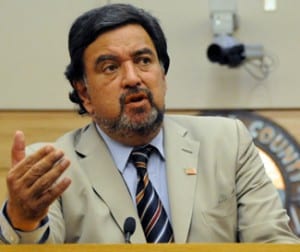
Gov. Bill Richardson (Photo by Heath Haussamen)
In his final days in office, Gov. Bill Richardson has made national news for going to North Korea to try to calm tensions, considering a pardon for Billy the Kid, and announcing that a blockbuster movie will be filmed primarily in New Mexico.
While at least two of those are good (I’m with those who say considering a pardon for Billy the Kid is a waste of time), those things are all notable because they get people talking about… Bill Richardson.
Being a politician seems to often come with an ego, but Richardson’s has been an ego on steroids. I don’t doubt that Richardson likes doing things that are good for others, but it is the ideas that are also good for his image that have really caught his attention and focus.
He’s convinced New Mexico to embrace some visionary projects, but his reckless ambition has also led to scandal that plagued his tenure.
Big ideas
The Albuquerque Journal’s Winthrop Quigley wrote recently that Richardson deserves credit for big ideas. He’s right.
Whether it’s trying to make Las Cruces the hub of the commercial space industry in North America, attempting to redefine transit in and around mid-sized cities with the Rail Runner, drawing film production to the state with financial incentives, or pushing the development of renewable energy with the creation of the Renewable Energy Transmission Authority, Richardson pushed visionary projects that have the potential to dramatically change New Mexico’s future.

Heath Haussamen
He dared New Mexicans to dream big. A state that didn’t have the vision to keep Bill Gates has, under Richardson’s leadership, taken some bold steps.
The problem: Those projects were largely about bolstering Richardson’s own image so he could become president.
Pay to play
Richardson entered the presidential race as an underdog. He and those helping him knew he would have to raise a ton of money if he was going to have a shot at securing the Democratic nomination.
Richardson pushed the legal limits of campaign finance laws and, in the opinion of many, crossed ethical lines (and maybe even legal lines). Countless news articles about Richardson donors getting lucrative contracts and influential political appointments made pay to play a household term.
I’ve said it before and I’ll say it again: I suspect history will remember Richardson more kindly than New Mexicans currently do. Even if only a couple of his big projects work out, they will have a significant impact on New Mexico’s future.
But Richardson came back to New Mexico in 2002 so he could be a big fish in a little pond and build his résumé in preparation for his presidential run. That ambition led to scandal after scandal that tainted his tenure as governor.
The irony
What’s ironic is that even that negative half of Richardson’s legacy has led to positive change in New Mexico.
All the scandals, shenanigans and disregard for ethical lines got the media, activists and lawmakers focused on ethics reform. It became politically popular to support such reform – to the point that Richardson actually pushed some of the very proposals that were inspired by the way he was doing business. (There’s that ego again.)
After eight years of Bill Richardson, we have a gift ban and expanded public financing. We have campaign contribution limits. We have legislative webcasting. We have a Sunshine Portal. We have reform of the State Investment Council. We have the Fraud Against Taxpayer’s act, which, ironically, Richardson signed into law and is now being used to sue him. We have open conference committees.
I could go on. The number of ethics and transparency laws passed in the last few years is astounding.
There were certainly other, dramatic public corruption cases that contributed to the climate for reform, including the state treasurer and metro court scandals.
But let’s be honest. When many of us heard story after story about potential pay to play in the Richardson administration, it simply became difficult to believe the tired line from Richardson’s people that campaign contributions did not affect his decisions.
As scandal after scandal brewed, the momentum pushing ethics reform forward only grew stronger.
Good from the good side, and the bad side
So I’ll call Richardson’s a dual legacy. In dreaming big, he convinced the state to place its hope in some long-term projects that have the potential to create a better economic future for New Mexicans. That’s his good side. His bad side helped create a climate ripe for structural ethics reform that was badly needed and will benefit New Mexico’s future.
For the first, I’ll thank Richardson for being a decisive leader, even if I don’t agree with every decision that was made and even though his motives weren’t necessarily pure. For the second… All I can say is that it really is true that good can come of any situation.